

Playing Monopolis Monopoly: An inquiry into why we are making ourselves so miserable. By J.
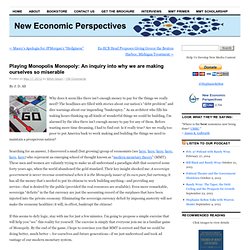
D. Business leaders mull case for Brighton pound. Thank You Your comment has been accepted.

Business leaders mull case for Brighton pound 4:56pm Wednesday 14th November 2012 in News By John Keenan, business editor Council and business leaders are examining a scheme to introduce a local currency for Brighton. Debunking another cornerstone of the Austrian-Keynesian dialectic: do Central Banks really control the Money Supply? « Real Currencies. The notion that Central Banking is the heart of the issue is the main idea behind the “End the Fed movement”.
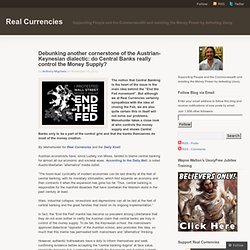
But although we at Real Currencies certainly sympathize with the idea of closing the Fed, we are also quite certain this in itself will not solve our problems. Memehunter takes a close look at who controls the money supply and shows Central Banks only to be a part of the control grid and that the banks themselves do most of the money creation. By Memehunter for Real Currencies and the Daily Knell Austrian economists have, since Ludwig von Mises, tended to blame central banking for almost all our economic and societal woes.
Worgle. 100% Reserve. What's all the fuzz about money? - Opinion. Chiang Mai, Thailand - In response to the 2008 global meltdown, there are really two arguments for what needs to happen next.

Why MMT is like an autostereogram. It’s the Interest, Stupid! Why Bankers Rule the World. In the 2012 edition of Occupy Money released last week, Professor Margrit Kennedy writes that a stunning 35% to 40% of everything we buy goes to interest.
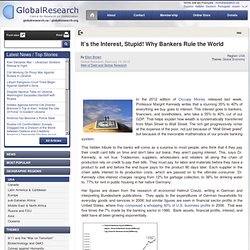
This interest goes to bankers, financiers, and bondholders, who take a 35% to 40% cut of our GDP. That helps explain how wealth is systematically transferred from Main Street to Wall Street. The rich get progressively richer at the expense of the poor, not just because of “Wall Street greed” but because of the inexorable mathematics of our private banking system. This hidden tribute to the banks will come as a surprise to most people, who think that if they pay their credit card bills on time and don’t take out loans, they aren’t paying interest.
This, says Dr. Her figures are drawn from the research of economist Helmut Creutz, writing in German and interpreting Bundesbank publications. Exponential growth in financial sector profits has occurred at the expense of the non-financial sectors, where incomes have at best grown linearly. What is Debt? – An Interview with Economic Anthropologist David Graeber. David Graeber currently holds the position of Reader in Social Anthropology at Goldsmiths University London.
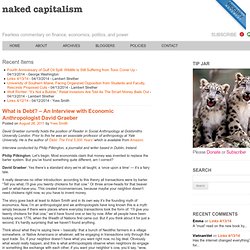
Prior to this he was an associate professor of anthropology at Yale University. He is the author of ‘Debt: The First 5,000 Years’ which is available from Amazon. Interview conducted by Philip Pilkington, a journalist and writer based in Dublin, Ireland. Philip Pilkington: Let’s begin. A local currency; Getting clear about its use. Why introduce a new currency?
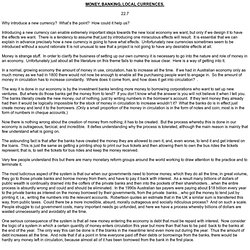
What’s the point? How could it help us? Introducing a new currency can enable extremely important steps towards the new local economy we want, but only if we design it to have the effects we want. There is a tendency to assume that just by introducing one miraculous effects will result. It is essential that we can explain in advance precisely how a new currency is going to have what effects. Money is strange stuff. In a normal, growing economy the amount of money in use, circulation, has to increase all the time. The JAK Bank: Interest Free Full Reserve Banking! « Real Currencies.
The JAK Bank provides us with an important model for interest free saving and lending.
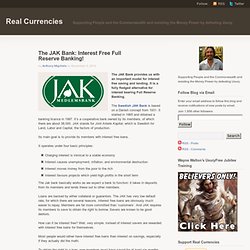
It is a fully fledged alternative for interest bearing Full Reserve Banking. The Swedish JAK Bank is based on a Danish concept from 1931. It started in 1965 and obtained a banking licence in 1997. It’s a cooperative bank owned by its members, of which there are about 38,000. JAK stands for Jord Arbete Kapital, which is Swedish for Land, Labor and Capital, the factors of production. Its main goal is to provide its members with interest free loans. It operates under four basic principles: Charging interest is inimical to a stable economyInterest causes unemployment, inflation, and environmental destructionInterest moves money from the poor to the richInterest favours projects which yield high profits in the short term The Jak bank basically works as we expect a bank to function: it takes in deposits from its members and lends these out to other members. Loans are backed by either collateral or guarantors. The capitalist network that runs the world - physics-math - 19 October 2011.
AS PROTESTS against financial power sweep the world this week, science may have confirmed the protesters' worst fears.

An analysis of the relationships between 43,000 transnational corporations has identified a relatively small group of companies, mainly banks, with disproportionate power over the global economy. The study's assumptions have attracted some criticism, but complex systems analysts contacted by New Scientist say it is a unique effort to untangle control in the global economy. Pushing the analysis further, they say, could help to identify ways of making global capitalism more stable. David McWilliams Explains Why Austerity Is Doomed In Europe. A very interesting video by an Irish economist explaining how the current reduce government spending (“austerity”) approach to the Eurozone debt and currency crisis is doomed to fail.
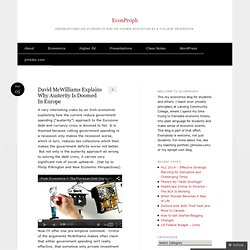
It is doomed because cutting government spending in a recession only makes the recession worse, which in turn, reduces tax collections which then makes the government deficits worse not better. But not only is the austerity approach all wrong to solving the debt crisis, it carries very significant risk of social upheaval. (hat tip to Philip Pilkington and New Economic Perspectives). Now I’ll offer one pre-emptive comment. Critics of the arguments McWilliams makes often claim that either government spending isn’t really effective, that somehow only private investment spending will stimulate an economy.
Reinventing Money Thomas H. Greco Jr. A local currency; Getting clear about its use.